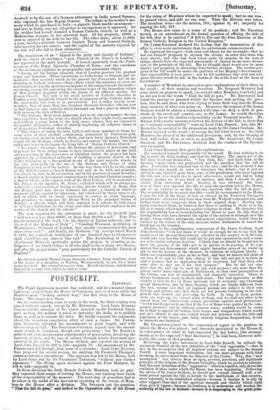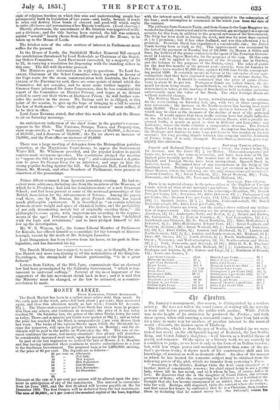POSTSCRIPT.
SATURDAY.
The Papal Aggression measure has suddenly, and in a manner almost ludicrous, escaped from the House of Commons, and, as it were while the Members were "looking another way," has fled away to the House of Lords. The stages were these.
On the understanding come to early in the week, the third reading was passed without remark, except by Mr. REYNOLDS. Lord JOHN RUSSELL then moved the omission of the clause inserted on Sir Frederick Thesi- ger's motion, for making it penal to introduce the bulls, or to publish them, as well as to assume the titles. He briefly repeated the arguments about the vexatious cumulative effect of such a clause. Sir FREDE- mot THESIOER defended his amendments at great length, and with his accustomed skill. The SOLICITOR-GENERAL argued that the amend- ment would be vexatious, though not persecuting ; but Mr. Roenuew pointed out very inconvenient consequences of persecution, involving the bastardy of issue, and the loss of estates, through fanatic Protestant pro- ceedings in the courts. The House divided, and rejected the motion of Lord John Russell by 208 to 129—majority 79. An amendment by Mr. FR.ESHFIELD fell through, from want of a seconder. Lord Joarr RUSSELL then proposed his second motion, for omitting Sir Frederick Thesiger's common-informer amendment. The question was left to the House, both by Lord Josue and by Sir FREDERICK THESIGER, " without any further argument." The House again declared against the First Minister, by 175 to 124—majority 51. In these divisions the Irish Roman Catholic Members took no part : they repeated their coupe of leaving the House, and washing their hands of the responsibility of the measure. The next step of procedure had to be taken in the midst of the movement occurring on the return of Mem- bers to the House after a division. The SPEAKER put the question, " That the bill do pass" mid looked to the Opposition side of the Souse for the rising of Members whom he expected to speak; but no one rose : he paused twice, and still no one rose. Then the division was taken. The numbers were—for the motion, 263; against it, 46; majority for passing the bat, 217.
The House now came to a sense of its position ; and Mr. Gnamor moved, as an amendment on the formal question of affixing the title of the bill, that it be entitled "k Bill to Prevent the Free Exercise of the Roman Catholic Religion in the United Kingdom."
Sir damn GRAHAM declared his feeling that the termination of this affair is even more unfortunate than its unfortunate commencement.
He expressed his regret—with some self-blame for the oversight—that ho bad not himself proposed to adjourn the debate, in order that those who were absent, and who had been taken quite by surprise by the turn of things, should have the expected opportunity of joining in one more discus- sion on the principle of the bill. But he thought there would now be more dignity and propriety in abstaining from further division. The further pro- gress of the bill would be under the guidance of her Majesty's Government : that responsibility is very grave ; and be felt confidence that civil and reli- gious liberties would be safe in the hands of the noble Lord at the head of Government.
A number of Members in succession gave explanations of their share in the result ; of their surprise and .vexation. Mr. Sergeant MURPHY had come down on purpose to speak, [as several other Members vouched,] and he did not hear the words " That the bill do pass." Mr. REYNOLDS had found the passage so jammed whilst the Speaker was putting the:ques- tion, that he and those who were trying to force their way into the House were unaware of what was going on. However, the request of Sir James Graham would be almost a command with him—so deep a debt of gra- titude do his creed and country owe to Sir James : he would therefore consent to throw the further responsibility on the Treasury benches. Mr. KEOGH with caustic sarcasm reviewed the history of the bill, to show that no " ordinary responsibility " rests on Lord John Russell; but, like Mr. Reynolds, he assented to the proposition made by Sir dames Graham.. Mr. MOORE rejoiced at the result—at seeing the bill what it now is : the Irish Members arc pleased at the additional provisions, and, by the blessing of God, will violate them as often as possible. Mr. AGLIONEY, Sir JAMRS GRAHAM, and Mr. REYNOLDS, declared that the conduct of the Speaker was exemplary.
Lord JOHN RUSSELL then gave his explanations.
Ile considered himself irresponsible for the result. He had nothing to do but to move the third reading, and that the bill pass. The opponents of the bill chose to absent themselves. " You then, Sir," said Lord John to the Speaker, "most fairly and particularly put the question that the bill do pass. I certainly was surprised that no one rose; and for the moment I was disposed to rise myself, in order to introduce the debate ; but it just oc- curred to me, that if 1 spoke then, some of the gentlemen who have opposed the bill, and who might rise to speak afterwards, would not fail to bring charges against me of one -kind or another, and then I should be pre- cluded from answering them. Besides, it was obviously the busi- ness of those who opposed the bill to raise the question before the House, and to say whether or no they had any objection that the hill do pass." The responsibility he incurred was this—could he recommend it to the House to pass the bill in the shape it took as altered by Sir Frederick Thesiger's amendments—altered as they have been from Mr. Walpole's amendments, And further made more temperate than in their original shape ? Having ma- turely considered them, he believed that there is nothing an them or in the bill as it stands which militates against religious freedom. He therefore felt the responsibility less of recommending the House to pass the bill, than of leaving those who have invaded the rights of the nation to triumph over the people, whose wishes, sentiments, and general expectations, would thus be baulked by the failure of the only measure before Parliament to resent the insult put on the country. Alluding to the complimentary expressions of Sir James Graham, Lord John observed—" I do not think it would be enough for me to say that the members of the present Government, whether in this country or in Ireland, would take care that this bill would not be put into operation in such a man- lier as to violate religious freedom. I think that we should be bound not to move the passing of the bill—not to be parties to its passing, if we con- sidered that any Government which might hereafter succeed us would be able to use the powers of the measure in violation of religious liberty. I think our responsibility goes as far as that, and that we should fall short of our duty if we said we will take charge of this bill and put it in force in such a manner that no oppression shall be exercised, but that those who come after us may use it for that purpose." But he did not con- sider that the bill can be used for any such purpose ; any more than the powers under many other acts of Parliament, or than some prerogatives of the Crown, can now be tyrannically and wantonly exercised. There is always Parliament ready to check such abuse. The real aggression on this country is that the See of Rome pretends not to recognize any Christians except themselves, and by their theories, which are totally different from the fact, assume also that all baptized persons are subject to their own bishops and priests, and that there are not persons belonging to the reli- gion of this country and professing its faith. As long as these preten- sions are kept up, we cannot allow of them, and we shall not allow to be erased from our statute-book certain provisions against such pretensions. "I own that it appears to me that if the bee of Rome were guided by the com- monest prudence and by ordinary common sense, nothing would be easier for it than to appoint its bishops with names and designations which would not give offence to any one—which would not internee with the title and supremacy of the Queen, and, being entirely religious designations, would be innocent and harmless."
Mr. GLADSTONE joined in the expression of regret at the position in which the House was placed; and sincerely apologized to the House if, in consequence of what he had suggested the day before, [the arrange- ments as to the expected "final discussion,"] he had been, however indi- rectly, the cause of that position.
Reviewing the topics introduced by Lord John Russell, he refuted the
assumption tohefalittehwaelldebafiln.riptitizedon opfetresntoens" raealred subject t too aggression roammt it Pontiff. A more Important declaration, and one more pregnant with fatal meaning, he never heard from the Minister of the Crown. Why, this "new assumption" has always been an opentlavowed,htirgorious, and legitimate principle of the religion of the Renton Ca olies, w • • we profess to tolerate. And this new definition of the " aggression " which is repelled, only shows the olargument itregs u eunt hptpeof or taus nstudme dp confusion of ideas under which the House has been legislating. Following the advice of Sir James Graham, he should now content himself with a so- lemn protest against the bill, as hostile to the instinitions of this eotuttry, more especially to its established religion—because it teaches it to rely au alone give it vigour—because its tendency is to undermine and weaken the authority of the law in Ireland-becauee•n,ic dispetutting to the groat Prin- ciple of religious freedom on which this wise and understanding people has permanently built its legislation of late years—and, lastly, because it tends to relax and destroy those bonds of concord and good-will which ought to unite all classes and persuasions of her Majesty's subjects. (Loral cheering.) Shortly afterwards, the amendment of Mr. Grattan was negatived with- out a division and the title having been carried, the bill was ordered, amidst " several " hearty cheers from different parts of the House, to be taken up to the House of Lords.
The briefest note of the other matters of interest in Parliament must suffice for the present.
In the House of Lords, the Smithfield Market Removal Bill escaped the annihilation threatened by Lord Redesdale as Chairman of the Stand- ing Orders Committee. Lord BEAUSIONT succeeded, by a majority of 76 to 22, in carrying a resolution thr dispensing with the standing orders in this case. The bill will therefore proceed.
The Ministers gave information in reply to questions. To Lord Jo- eBLYN, Chairman of the Select Committee which reported in favour of the Cape route for the steam communication with Australia, the CHAN- CELLOR of the EXCHEQUER said, there are some points of detail which the Committee did not consider, and he must make further inquiry. Sir GEORGE GREY informed Sir JOHN PAKINGTON, that he has considered the report of the Committee on District Prisons, and hopes at no distant period to carry out their -views at Dartmoor Prison : he will further con- sider the matter in the recess. Mr. BAINES said he is obliged, at this point of the session, to give up the hope of bringing in a bill to amend the law of Settlement—" the early part of next session" must suffice, if he be then in office.
Lord JOHN RUSSELL stated, that after this week he shall ask the House to sit on Saturday mornings.



























 Previous page
Previous page